NATO to stay in Afghanistan: Rasmussen
Rasmussen told a major international conference in Kabul that NATO alliance would remain in Afghanistan.
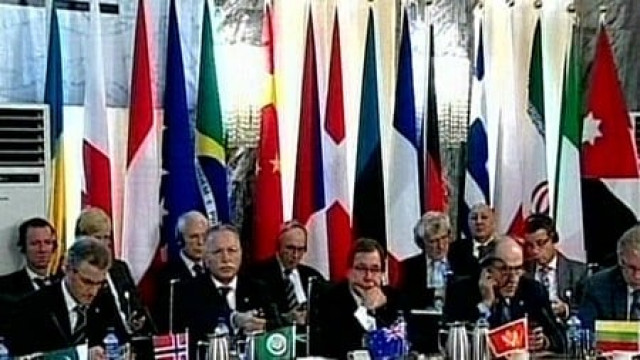
NATO chief Anders Fogh Rasmussen told a major international conference in Kabul on Tuesday that the alliance would remain in Afghanistan even after Afghans take over responsibility for security.
Afghan President Hamid Karzai had said that Afghans wanted to have responsibility for their own security by 2014.
"I remain determined that our Afghan national security forces will be responsible for all military and law enforcement operations throughout our country by 2014," he told the conference, called to discus how much more responsibility to give Afghanistan for its own affairs.
Rasmussen said transition would be based on "conditions, not calendars" with NATO forces working to train Afghan police and army to take the lead in protecting the country from a nearly nine-year Taliban insurgency. "Transition will be done gradually -- on the basis of a sober assessment of the political and security situation, so that it is irreversible.
"And when it happens, international forces won't leave; they will simply move into a supporting role," he said. "We have not come this far, at this cost, to falter just as we see our common goal take shape."
Afghanistan opened a landmark international conference in Kabul on Tuesday, aiming to chart a future of peace and development and show supporters the war-torn country is acting on past pledges.
Billed as the first step of the Afghan government's transition from dependence on Western backers to running the country alone and responsibly, it is the biggest international meeting ever to be held in the Afghan capital.
The nine-year war in Afghanistan is now killing record numbers of Western soldiers and the Taliban control large swathes of the south despite a US-led push to boosting the total number of foreign troops to 150,000 in coming weeks. There is growing alarm in the West over progress of a counter-insurgency strategy designed to reverse Taliban momentum and mounting concern about governance and graft in what is one of the world's most corrupt countries.
Thousands of Afghan police, military and security forces, backed up by NATO forces, put Kabul under security lockdown to guard against any possible Taliban attack marring the conference at the heavily protected foreign ministry. The airport and key roads were closed. Pedestrian access was strictly limited, and Monday and Tuesday declared public holidays in Kabul.
The interior ministry said rockets exploded in Kabul near the airport overnight, but there were no casualties. The conference opened shortly after 9:30 am (0500 GMT) with a Quranic prayer, following President Hamid Karzai’s scheduled to give a keynote address.
UN chief Ban Ki-moon, who is to join Karzai in chairing the conference, has led international calls for him to unveil "concrete" steps to improve governance and promote national reconciliation after a nine-year Taliban insurgency.
US Secretary of State Hillary Clinton, who flew into Kabul late Monday for talks with Karzai ahead of the conference, said the meeting would be "very substantive and demonstrate more Afghan leadership".
Up to 70 international representatives, about 40 foreign ministers are scheduled to attend. Afghan officials are expected to outline proposals covering governance, economic and social development, rule of law and justice, human rights, peace and reconciliation, regional and global partnerships, and aid effectiveness. Western nations are under increasing public pressure to justify their aid and military commitments to one of the world's most corrupt countries where the war has killed at least 380 foreign soldiers so far this year.
Afghanistan and the United States are trying to reach out to Taliban foot soldiers, offering them jobs and cash in exchange for laying down their weapons. Karzai has also called for peace talks with insurgent leaders.
Writing in the International Herald Tribune, Rasmussen -- who on Monday toured battlegrounds in southern Afghanistan where Western troops have seen the worst fighting, said a transition to Afghan leadership would not be rushed. "This transition will not be done on the basis of an artificial timetable. It will be done on the basis of clear assessments of the political and security situation in each area," he said.
Central to the process, conference organiser Ashraf Ghani told AFP, is a commitment from the international community to grant the Afghan government control of 50 percent of all donor funds within two years. Since the Taliban regime was overthrown in 2001, only 20 per cent of pledged funds -- an estimated total of 40 billion dollars -- had been channelled through the Afghan budget, leading to serious corruption among the rest. While officials are adamant it is not a donors' conference, some have said the United States, Britain and Japan could add billions of dollars to their existing commitments.

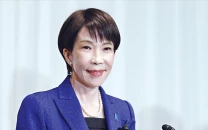
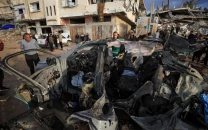
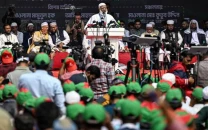

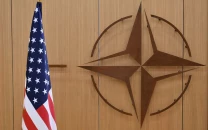
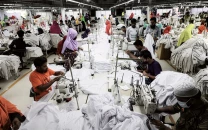












COMMENTS
Comments are moderated and generally will be posted if they are on-topic and not abusive.
For more information, please see our Comments FAQ